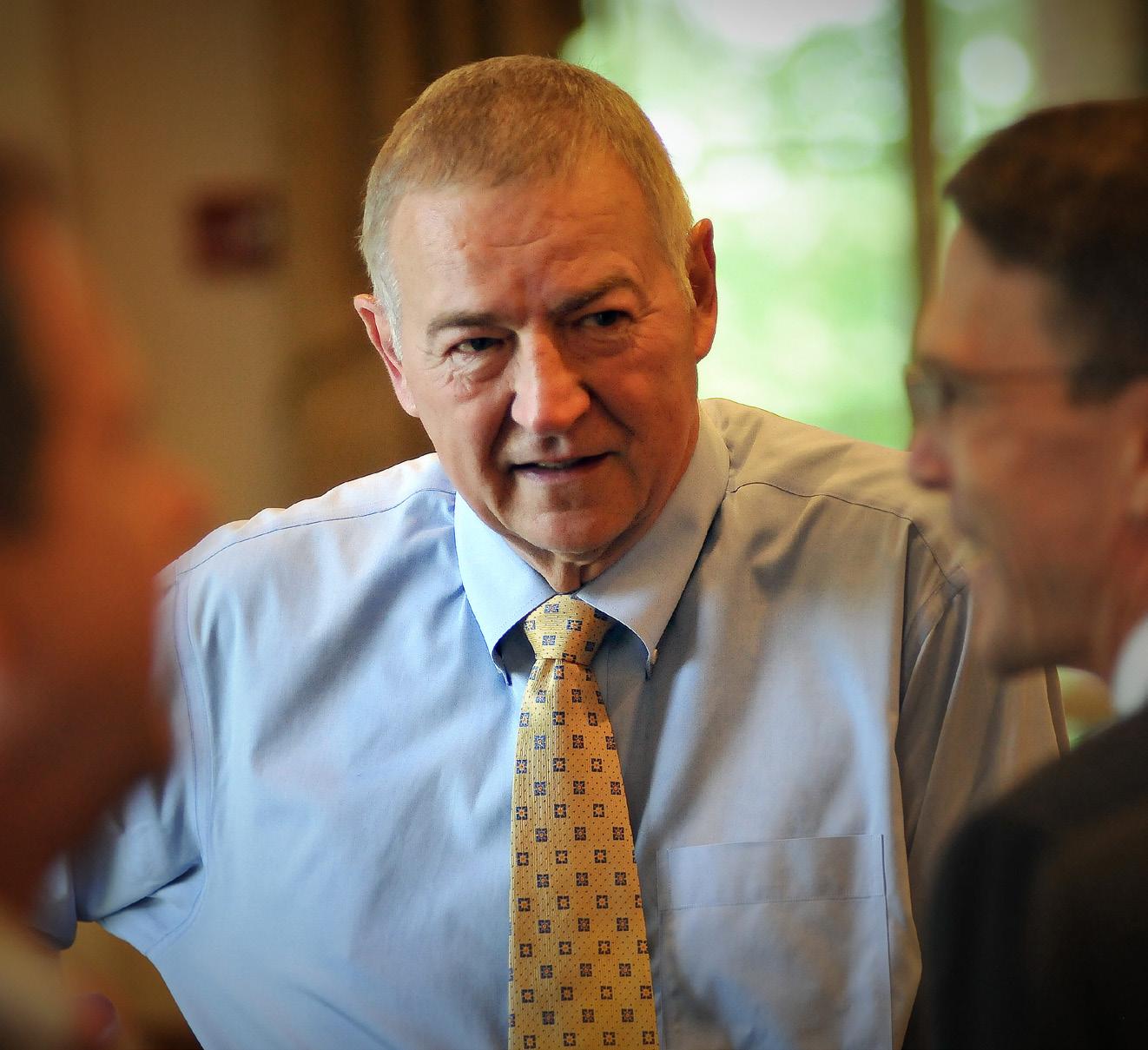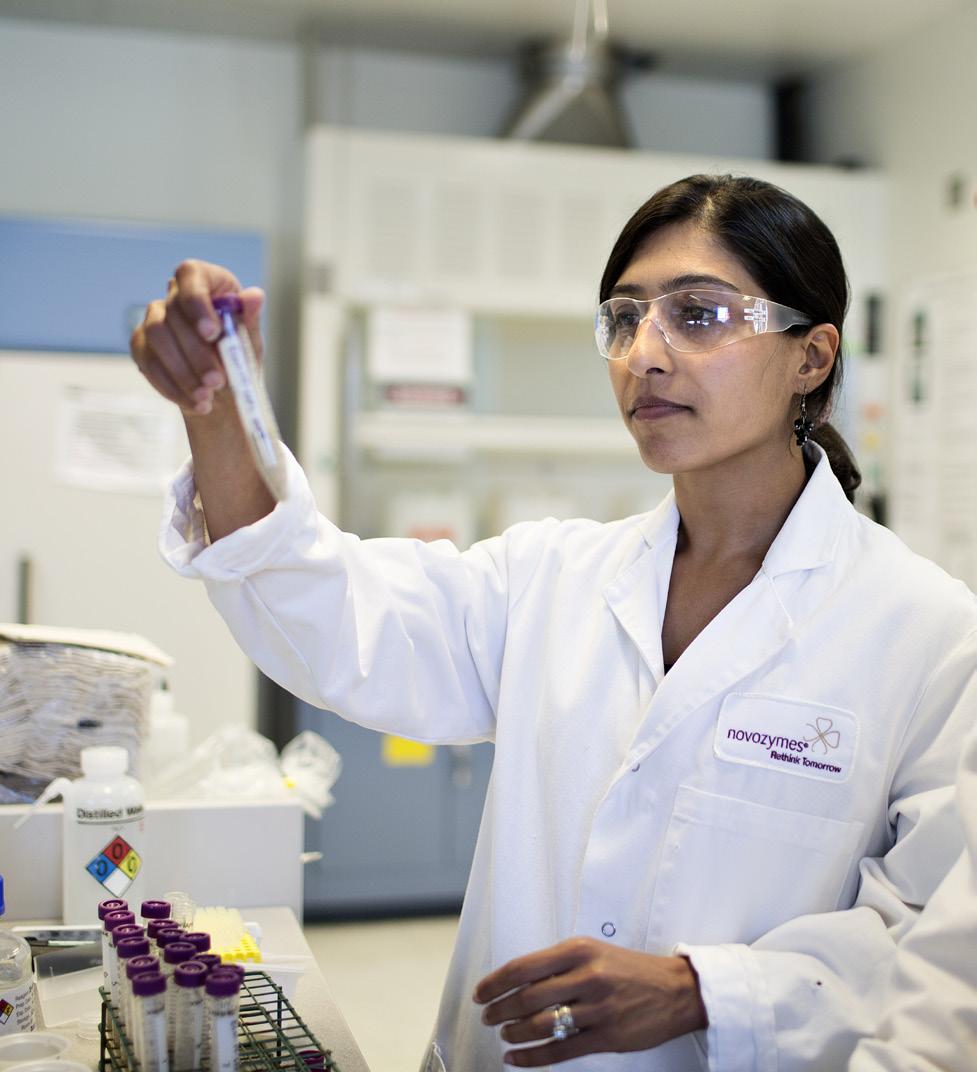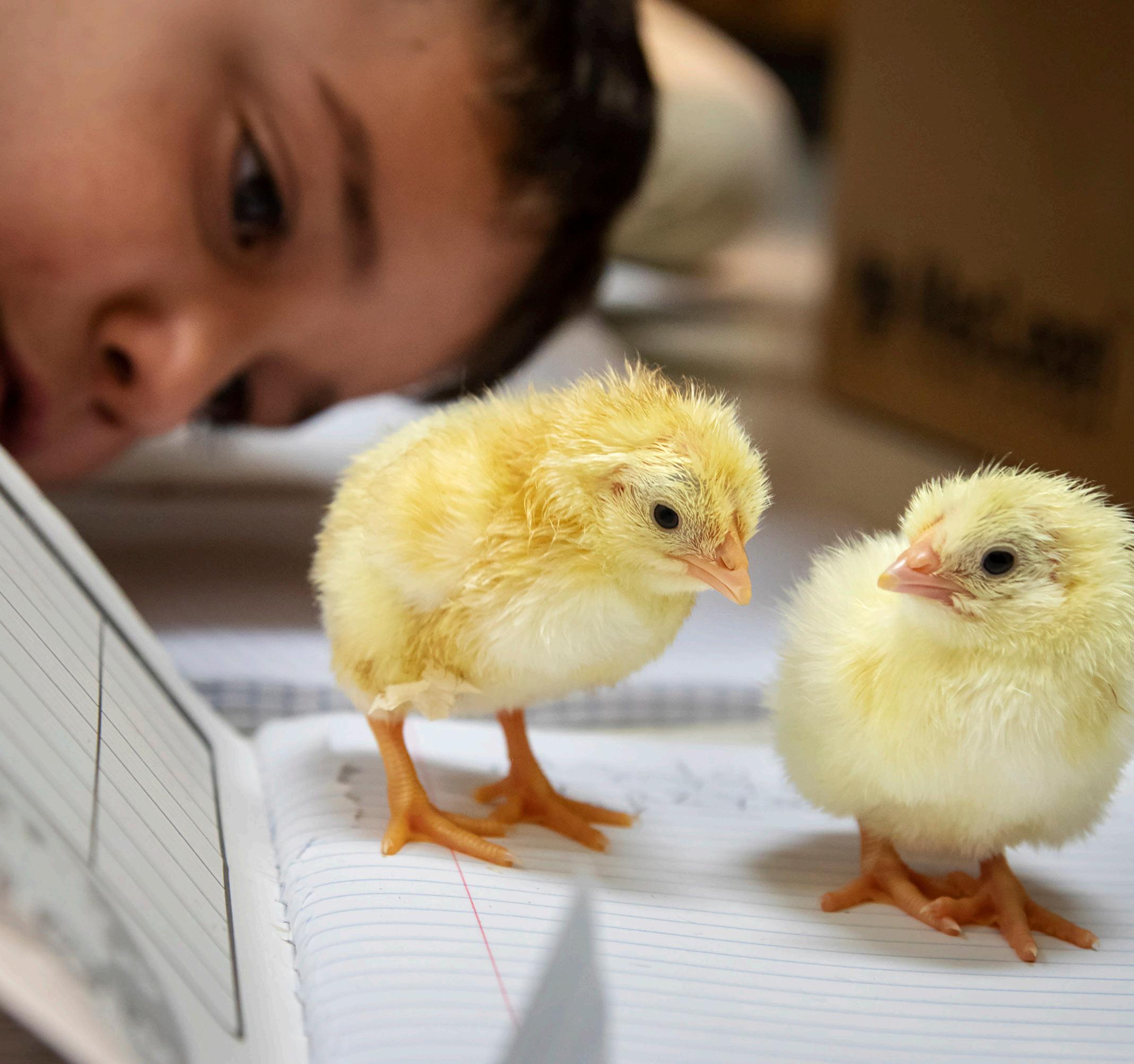
12 minute read
BIO-AG BREAKTHROUGHS
By John H. Tibbetts
CALS alumna Pam Marrone draws back the curtain for entrepreneurs, demystifying pathways to success. Since earning a Ph.D. in entomology, she has discovered, developed and guided to market more than a dozen groundbreaking biological solutions for agricultural pest management and built two startup bio-ag companies from scratch to millions of dollars in revenue.
Marrone, executive chair and partner at Primary BioAg Innovations and Global BioAg Linkages, focuses on pest control products derived from living organisms—for example, plant extracts and microbes that limit damage from insects and diseases. She says most startups offering one or a few biological products fail to “cross the chasm” from niche markets to mainstream success.
A startup’s new biopesticide, for instance, might better control a fungus while improving soil health and providing other environmental benefits. But growers are understandably cautious about unfamiliar products.
“There are about 150 companies worldwide that develop and sell not only biopesticides but also bionutrients, biofertilizers and biostimulants, which increase crop growth without controlling a pest,” Marrone says. “But very few get above $10 million in revenue. That’s where I’m helping to advise and mentor.”
About half of her clients are startups and half are more established biological companies that want to expand globally and enter the U.S. market. Marrone advises her clients to develop strong scientific data on their products, collaborate with growers on experimental plots, demonstrate grow-out success stories, gain other early adopters, and finally reach out to distributors and agricultural extension specialists who are gatekeepers to mainstream growers.
“She is a great mentor,” says Fatma Kaplan, CEO of Pheronym, based in Davis, California. “When you’re a startup like ours, you are very good at running the science aspect, because that’s our training. But when it comes to the business aspect, it’s not that easy.
“We were talking to a distributor, and the minute we said, ‘Oh, you know,
Pam Marrone is our adviser,’ suddenly our technology had a credential because the distributor knows her and her credentials.”
Marrone credits NC State, a leader in integrated pest management (IPM) research and education, for her nearly 40-year agricultural science career. “I had a practical curriculum in applied ag sciences, taking courses in plant pathology, all kinds of entomology, soil science, and crop and weed sciences,” she says. “When I graduated, although I hadn’t grown up on a working farm, I had a breadth of the disciplines.”
But it wasn’t easy for women in agriculture when she started out. “NC State’s graduate program was one of the few that didn’t ask discriminatory questions or say they didn’t want any women. They welcomed women with open arms.”
In her first informational job interview as a graduate student, she was taken aback by unvarnished sexism she encountered in the business world. “My cohort of three women at NC State went to talk with a local chemical pesticide company. The interviewer said, “I’m going to ask you how many babies you’re going to have before you’re 30.’ I was astonished and said, ‘You can’t ask that question. And he said, ‘I just did.’”
She began her industry career at Monsanto partly because “they didn’t ask those kinds of questions.” For Monsanto, she developed high-throughput, automated systems for identifying proteins to fight corn rootworm. Marrone’s team identified a protein that Monsanto engineered into its corn seed, which became a blockbuster product.
Her first start-up, Entotech, was a biopesticide company for the Danish company Novo Nordisk. Her second bio-ag start-up, AgraQuest, was acquired by Bayer Crop Science for nearly $500 million. Her third startup, Marrone Bio Innovations (MBI), was listed on NASDAQ in 2013. MBI has screened over 18,000 microorganisms and 350 plant extracts to develop seven successful product lines. Marrone stepped down as CEO in 2020 to focus on advising clients.
“My legacy is that I have brought deep science to this industry, showing that these biological products are not snake oil and that they offer value in integrated pest management programs,” she says. “Biologicals have become more mainstream. But $60 billion in chemical pesticides are sold today and only $3 billion in biologics. So, we still have some way to go with companies that could cross the chasm to mainstream success.”
Marrone is investing in the future at CALS, where she and her companies are longtime supporters of faculty programs. With her husband, Mick Rogers, Marrone was one of the first to make a naming donation to the new Plant Sciences Building. She also has a million-dollar planned gift to create entrepreneurial awards for graduate students in the Department of Entomology and Plant Pathology.
“The CALS faculty, especially in entomology, were so dedicated to helping students succeed,” Marrone says. “For that and the fundamental
IPM education, I wanted to give back to CALS.”
CALS GLOBAL
Jim Goodnight, SAS CEO
Multinational developer of analytics software based in Cary, N.C.
BACKGROUND
SAS was born at NC State, where the company’s first project was analyzing crop yield data. Honoring its roots, SAS forged a new agricultural technology business unit to help growers and agribusiness leaders turn this exploding amount of farm and agricultural data into insights that inform safe and secure food production. The SAS Global Academic Program is also developing resources to help train the next crop of agricultural analytics experts.
GOALS
This public-private partnership will enhance agricultural research and analytics talent development to support feeding a burgeoning world population, estimated to exceed 10 billion by 2050.
NEED
“NC State is proud to have SAS partner in the N.C. Plant Sciences Initiative, a critical effort to keep the university at the forefront of plant science research and education, and to keep North
Carolina agriculture competitive in a global market.”
NC State Chancellor Randy Woodson
OUTCOMES
CALS Dean Richard Linton
PARTNERSHIPS
Global biotechnology company with North American headquarters in Franklinton, N.C.
BACKGROUND
Novozymes is the world leader in biological solutions, with a focus on helping find biological answers for better lives in a growing world. Novozymes’ enzymes and microorganisms can be found in everyday products from laundry detergents to biofuels, animal feed and crops.
The company partners with NC State in plant sciences, human health and agricultural biosciences research. Novozymes projects are underway in the College of Agriculture and Life Sciences and the Wilson College of Textiles.
GOALS
Novozymes, which has been in North Carolina for 40 years, is stepping up its collaboration with NC State under a five-year research agreement signed in 2019 that includes projects related to the N.C. Plant Sciences Initiative (N.C. PSI).
Brian Brazeau, President of Novozymes North America Vice President, Agricultural and Industrial Biosolutions, Americas
NEED
Mike Elder, Novozymes North
America’s head of business relations and business development
OUTCOMES
CALS Dean Richard Linton

Photos courtesy of Grant Merritt, The News Reporter
County Extension director Dalton Dockery has shown his steadfast support for the people of Columbus County through times of crisis. When Hurricane Florence hit in 2018, flooding left many residents without power, food and water.
“The National Guard was able to get food to the county, but we had to find a way to distribute it to all of the communities. We worked with local leaders to set up a transit system to make sure everybody received food. We wanted to take care of our people,” Dockery says. The CALS alumnus also works to address racial and political division within the predominantly white county.
“Having this role as director, I saw it as an opportunity to help unify the county. We had a highly contested sheriff’s race a while back… There was so much racial tension, we needed to do something to bring the community together.”
Dockery, clergy members and other local leaders started Unify Columbus to help community members talk about difficult issues, face to face.

The News Reporter, June 9, 2020
“Dalton had a longing to move this community beyond its division,” says Joe Washburn, pastor of First Presbyterian Church in Whiteville, North Carolina, who met Dockery soon after moving to Columbus County in 2017. “He knows we all have our differences, but there’s more that brings us together than divides us.”
The group invited clergy from different backgrounds and religions to help lead the first community conversation at a local high school auditorium. They talked about three topics: skin color, education and religion. That session led to a second project where church leaders invited pastors from different denominations and racial backgrounds to speak to their congregations. They found they had much in common, Dockery says.
“It doesn’t matter what your economic background is or the color of your skin. It doesn’t matter where you come from. But what does matter is that we respect everybody for who they are,” he says.
For Dockery’s work as an advocate for his community, county and state, NC State honored him with a 2020 Award of Excellence in Public Service.
“Dalton genuinely desires to help others. He lives to serve and it’s never about him,” Washburn says. “With Unify Columbus, he created a foundation where we can all come together and celebrate unity.”
“I was excited and happy to receive the award, but I was most excited that it was an opportunity to promote goodwill and shed light on work that’s being done in Columbus County,” Dockery says. “I want to thank my wife, Sheila Dockery, and our children, Whitely and Bryson, who continue to support me in my endeavors.”
Path to Serve
Growing up in Nakina, North Carolina, Dockery was one of eight Black students in his high school graduating class of 90. Working on his grandfather’s 100-acre farm with his father, mother and grandfather shaped Dockery’s work ethic and values.

“Cropping tobacco, maintaining crops, taking care of animals … that’s where I got my start and that’s really the foundation of how I learned to work hard and achieve my goals. Public service has always been my way of life. My parents instilled in me that we are here to serve.”
As the family began to farm less, Dockery realized he wanted to continue working in agriculture.
“I knew the best way to do that was to go into the educational side of it and learn as much as I could. NC State is one of the premier universities when it comes to agriculture.”
Dockery graduated in 1994 with a bachelor’s degree in agricultural education and in 2000 with a master’s degree in agricultural and extension education. He earned a Ph.D. in leadership studies from NC A&T State University in 2015.
Dockery’s philosophy is that there’s always room for growth.
“We’re constantly transitioning,” Dockery says of his community. “I want to play a role in that transition, to make people, no matter what their backgrounds are, feel comfortable in America. I think we have a duty to do that.”
— Kristin Sargent
Unify Columbus
A Welcome Friend

The most interesting job at NC State? Frank Jeter often said that it was his.
Jeter worked as a college agricultural writer and editor from 1914 to 1920 and from 1922 until he died in 1955, telling the story of North Carolina’s agricultural progress and of NC State’s role in that progress.
A 1957 pamphlet from the Federal Extension Service praised Jeter’s pioneering efforts in extending university knowledge to the people who needed it. When Jeter joined the newly established North Carolina Agricultural Extension Service in November 1914, there was no example to follow. He hit the ground running, creating packets of agricultural news and information for newspapers, agricultural publications and others. That effort led to hundreds of speaking engagements across the state, as well as regular farm radio broadcasts and farm shows for public and commercial TV.
The pamphlet writer who chronicled Jeter’s contributions noted that “he was always a welcome friend at the farmer’s hearth, equally at home in the city dwelling, and his deep-rooted wisdom was eagerly sought in the agricultural councils of the state and federal governments.”
Communications technology, the state’s demographics and the public’s media preferences changed significantly over the course of Jeter’s career—and so did his approach. The same is true of today’s NC State Extension professionals. They continue to conduct field days as well as farm visits to help growers identify and solve problems, support 4-H clubs that instill leadership in young people, deliver food safety and nutrition education to improve the lives of all people—and much more.
At the same time, they use communications technology in ways that resonate with people across the state. Extension’s Homegrown is one of those ways. The online video series delivers trusted, researchbased information and answers from Extension experts in an easily accessible format. The goal? To reconnect people to the food, landscapes and agriculture vital to their lives.
FROM THE ARCHIVES
Frank Jeter was as comfortable with his hands on a typewriter as he was in front of a microphone. Here, he interviews members of Extension’s home demonstration staff for a national episode of an NBC radio program.
Learn more at
go.ncsu.edu/Homegrown
Add your name to plant science excellence.
Agriculture and the life sciences built North Carolina. Interdisciplinary research, teaching and innovation at the N.C. Plant Sciences Initiative will keep it growing. Add your name to help ensure its success. Learn about our naming opportunities at: go.ncsu.edu/add-my-name.
What we Think and Do drives plant science innovation.
Support our work with your financial contribution.


NC State University Plant Sciences Building
In progress, February 2021 (above) A rendering of the finished building (left)
RALEIGH, NC PERMIT No. 2353
Creatures Great And Small
Kids can’t wait to learn more about animals through 4-H. Read about some new ideas we’ve hatched.
See story on page 22.






